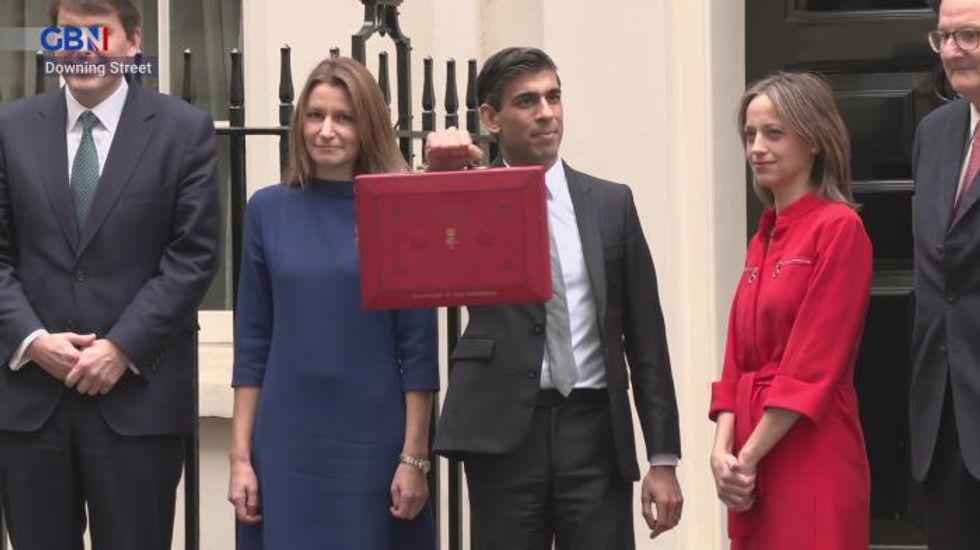With rising inflation, higher energy bills and supply chain issues, the Chancellor is expected to address the cost-of-living problem.
Don't Miss
Most Read
Trending on GB News
Chancellor Rishi Sunak will use his Budget to set out plans for a post-coronavirus economy, boosted by better-than-expected forecasts but against a backdrop of a rising cost of living.
Mr Sunak, who posed for the traditional photos outside No 11 Downing Street before heading to Parliament, will hail a “new age of optimism” as the economy recovers from the pandemic hit.
The Chancellor is set to strike an upbeat tone as he talks about building a “stronger economy of the future”, with the promise of rising wages, cash for the NHS and investment in regional transport projects.
Mr Sunak’s spending plans are likely to be bolstered by forecasts of faster growth than predicted in the spring as the economy roars back into life after the lifting of coronavirus restrictions, according to analysts.
The Office for Budget Responsibility (OBR) is expected to up its growth outlook for 2021, cut its unemployment prediction and pencil in lower borrowing thanks to higher tax receipts.
The EY Item Club, a UK economic forecasting group, believes the OBR will hike its gross domestic product (GDP) forecast for 2021 to growth of 7% from the 4% forecast at the last fiscal statement in March.
It also predicts the OBR will slash its estimate for how much the pandemic has scarred the economy to as low as 1%, which could boost the Government’s fiscal position by £25 billion a year by 2025.
With the Budget taking place against a backdrop of rising inflation, higher energy bills and supply chain issues, Mr Sunak is expected to take action to address the cost-of-living problem.
He has already announced an increase in minimum wages and an end to the UK Government’s public sector pay freeze but is also widely expected to help Universal Credit claimants by allowing them to keep more of the benefit as they earn more.
The “taper rate”, the amount of benefit taken away for every £1 earned above the claimant’s work allowance, will reduce from 63p to 60p, The Sun reported.
Rishi Sunak is expected to address the cost of living in the Budget 2021.
GB News
While this will ease the burden on claimants who are in work by providing more of an incentive to increase their hours, it does not compensate for the £20-a-week reduction earlier this month or do anything to help people who are not in work.
Torsten Bell, from the Resolution Foundation think tank, said: “If the taper rate is cut, that’s very good news for how our benefits system works and for some lower-income families – but will still leave the poorest households going into Christmas much worse off than they were.”
During his speech, Mr Sunak is expected to say: “Today’s Budget begins the work of preparing for a new economy post-Covid.
“An economy of higher wages, higher skills, and rising productivity, of strong public services, vibrant communities and safer streets.
“An economy fit for a new age of optimism. That is the stronger economy of the future.”
Labour leader Sir Keir Starmer said: “The Budget must take the pressure off working people.”
He said a Labour administration would cut VAT on domestic energy bills for six months and “wouldn’t hike taxes on working people” – a reference to April’s scheduled 1.25 percentage point increase in national insurance contributions.
What will be contained in the Budget has been heavily briefed in recent days, much to the annoyance of Commons Speaker Sir Lindsay Hoyle, who suggested ministers should resign for dishing out details to the media before MPs have heard the speech.
The Government has already confirmed that Mr Sunak will announce a rise of the so-called “national living wage” to £9.50 from April – up more than 6%, increasing by 59p per hour for those aged 23 and over – and the end of the year-long pay freeze he imposed on public sector workers.
However, ministers have so far refused to say whether the increase for state employees such as teachers, nurses and police officers will be a real-terms rise by being higher than inflation, with the consumer price inflation rate currently standing at 3.1%.
Any rising wages will also come against a backdrop of household income pressures caused by a cost-of-living crunch and recent Government decisions.
National insurance contributions for workers are being increased by 1.25 percentage points from April to help pay for the NHS and social care, while Mr Sunak ended the £20-a-week Universal Credit coronavirus uplift earlier this month.
Mr Sunak will confirm a further £5.9 billion in capital funding to help the NHS clear the backlog created by Covid-19.
The Treasury has pledged green investment and policies to take advantage of post-Brexit freedoms and has touted nearly £7 billion of funding to overhaul local transport.
Mr Sunak is understood to have all but confirmed to MPs that he will not increase fuel duty at a time of high pump prices.









